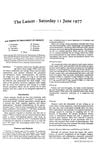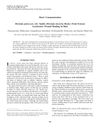 60 citations,
May 2018 in “Indian Journal of Psychological Medicine”
60 citations,
May 2018 in “Indian Journal of Psychological Medicine” Women with PCOS often experience anxiety, depression, and a lower quality of life.
 60 citations,
September 1979 in “Fertility and sterility”
60 citations,
September 1979 in “Fertility and sterility” Spironolactone can reduce hair growth in women with hirsutism.
 54 citations,
March 1987 in “Journal of The American Academy of Dermatology”
54 citations,
March 1987 in “Journal of The American Academy of Dermatology” 3% topical minoxidil effectively treats extensive alopecia areata with few side effects.
 54 citations,
February 1986 in “Archives of Dermatology”
54 citations,
February 1986 in “Archives of Dermatology” Higher minoxidil concentration (5%) works better for severe hair loss, with most patients seeing regrowth in 48-60 weeks.
 53 citations,
November 1992 in “Mayo Clinic Proceedings”
53 citations,
November 1992 in “Mayo Clinic Proceedings” HIV can cause unusual and severe skin problems that are hard to treat.
 53 citations,
June 1977 in “Lancet”
53 citations,
June 1977 in “Lancet” Jaw wiring helps with weight loss but long-term habits are needed to keep it off.
 53 citations,
May 1995 in “Journal of The American Academy of Dermatology”
53 citations,
May 1995 in “Journal of The American Academy of Dermatology” Syphilis can cause hair loss that looks like other conditions, but it improves with treatment.
 52 citations,
October 2016 in “Clinics in Dermatology”
52 citations,
October 2016 in “Clinics in Dermatology” Some medications can cause acne, and stopping these drugs is the main treatment.
 47 citations,
January 2013 in “International Journal of Cosmetic Science”
47 citations,
January 2013 in “International Journal of Cosmetic Science” Hair diversity is influenced by complex genetics and environmental factors, requiring more research for practical solutions.
 46 citations,
September 2011 in “Journal of Endocrinology”
46 citations,
September 2011 in “Journal of Endocrinology” Natural 5α-reduced glucocorticoids might be anti-inflammatory with fewer side effects than current options.
 44 citations,
January 2021 in “Dermatologic Therapy”
44 citations,
January 2021 in “Dermatologic Therapy” COVID-19 may cause hair loss due to infection stress or treatments.
 43 citations,
March 2011 in “Journal of psychosomatic research”
43 citations,
March 2011 in “Journal of psychosomatic research” Kids with alopecia areata may experience more stress but not necessarily feel more anxious or depressed than others.
 43 citations,
July 1984 in “Clinical and Experimental Dermatology”
43 citations,
July 1984 in “Clinical and Experimental Dermatology” Antiandrogen therapy helped increase hair growth in women with hormonal imbalances related to baldness.
 42 citations,
April 2021 in “Journal of clinical pharmacology”
42 citations,
April 2021 in “Journal of clinical pharmacology” Baricitinib helps treat several diseases, including COVID-19, but has side effects and needs careful monitoring.
 42 citations,
June 2015 in “Gynecological Endocrinology”
42 citations,
June 2015 in “Gynecological Endocrinology” Women with PCOS often have mood disorders and a lower quality of life, and treatment should focus on both physical and mental health.
 41 citations,
November 1993 in “Journal of The American Academy of Dermatology”
41 citations,
November 1993 in “Journal of The American Academy of Dermatology” DPCP helps treat severe hair loss, but 5% minoxidil doesn't add benefits.
 40 citations,
November 2011 in “American Journal of Human Biology”
40 citations,
November 2011 in “American Journal of Human Biology” Stress from being transgender is linked to higher blood pressure at night and more inflammation, which may affect heart health.
 40 citations,
March 1982 in “British Journal of Dermatology”
40 citations,
March 1982 in “British Journal of Dermatology” Young women with diffuse hair loss may have low SHBG levels, which could lead to more active testosterone and contribute to their hair loss.
 38 citations,
September 1996 in “Annals of Clinical Psychiatry”
38 citations,
September 1996 in “Annals of Clinical Psychiatry” Hair loss from mood stabilizers is common but can be managed without stopping the medication.
 37 citations,
March 1990 in “The Journal of Pediatrics”
37 citations,
March 1990 in “The Journal of Pediatrics” Toxic shock syndrome is caused by a complex interaction of bacterial toxins and the immune system, and understanding this can help improve diagnosis and treatment.
 35 citations,
October 2012 in “Dermatologic Clinics”
35 citations,
October 2012 in “Dermatologic Clinics” Autoimmune diseases can cause hair loss, and early treatment is important to prevent permanent damage.
 35 citations,
April 2006 in “Ocular Surface”
35 citations,
April 2006 in “Ocular Surface” Cosmetics and procedures can cause eye issues, from mild discomfort to serious conditions, due to allergies, toxins, or poor care.
 35 citations,
December 2006 in “Journal of medicinal food”
35 citations,
December 2006 in “Journal of medicinal food” Morinda pubescens fruit extract helps wounds heal faster in rats.
 34 citations,
August 2005 in “Dermatologic Clinics”
34 citations,
August 2005 in “Dermatologic Clinics” Stress and emotional factors can worsen skin conditions by affecting the immune system.
 34 citations,
March 2003 in “Veterinary Dermatology”
34 citations,
March 2003 in “Veterinary Dermatology” Most dogs with alopecia had higher than normal levels of certain hormones, but hair loss might not always be linked to these hormone changes.
 34 citations,
November 1987 in “Archives of Dermatology”
34 citations,
November 1987 in “Archives of Dermatology” Oral minoxidil helps hair regrowth in 80% of alopecia patients, but only 18% see cosmetic improvement.
 34 citations,
January 1987 in “Dermatology”
34 citations,
January 1987 in “Dermatology” Topical minoxidil effectively and safely treats extensive alopecia areata but doesn't change its course.
 33 citations,
December 2008 in “Journal of Dermatology”
33 citations,
December 2008 in “Journal of Dermatology” Adenosine lotion improves hair growth and thickness in women with hair loss.
 32 citations,
June 1976 in “JAMA”
32 citations,
June 1976 in “JAMA” Crash dieting can cause hair loss due to severe calorie restriction.
 31 citations,
February 2016 in “American Journal of Men's Health”
31 citations,
February 2016 in “American Journal of Men's Health” Finasteride can cause serious emotional side effects; doctors should check patients' mental health history before prescribing.






























